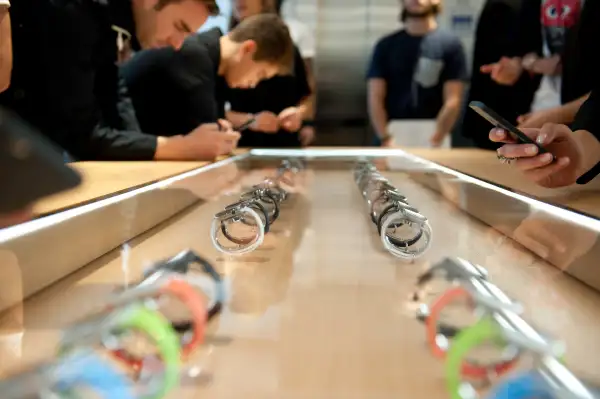The Real Reason So Many of Us Crave the Apple Watch

No one really needs an Apple Watch. Yes, it will have many uses, including tracking exercise, making mobile payments, reading email, and running all sorts of apps. But smartphones and other devices are capable of doing all of these things and more. So why do so many of us want an Apple Watch? Here are a few insights:
The Slow Striptease
A month ago, I was riding in an elevator in San Francisco (45 minutes from Apple headquarters) and noticed someone wearing what appeared to be an Apple Watch. I asked him if it was indeed the much-hyped unreleased watch. He said yes. He also said I couldn’t touch it. Okay, no problem, but how about giving me a quick review? No dice. Fine, at least tell me how it is that you got one. No way, not a chance.
I ambush people in elevators (and on planes, at parties, and everywhere else I go) all the time. As a consumer psychologist, I’m always curious, and it's my job to ask questions about why consumers do what they do. Almost always people enjoy sharing their purchases and spending plans with me. Not this guy, though. To be honest, I found the mystery and his aloofness to be highly intriguing (also, a bit humorous, especially the “don’t touch” part).
In effect, everyone has had a similar experience to my run-in with the Apple Watch guy. This has been one of the most protracted unveilings in history (Apple first announced the watch last September), and that slow striptease has so very much to do with our breathless anticipation of Apple's smartwatch.
I have nothing against smartwatches or Apple, mind you. I love my many Apple products, but for those considering a pricey new purchase, consider how much of your desire is real and how much is the result of emotional manipulation.
The Fetishization of Technology
Remember your first cell phone? Smartphone? GPS? If you’re old enough, you might remember your first computer and the thrill of typing without Wite-Out. We have witnessed one incredible innovation after another, and while the hits do keep on coming, the emotional impact of those pioneer experiences is hard to duplicate. But that doesn’t mean we don’t want to experience them again. We absolutely do want to bring back those feelings, so when Apple teases us with the promise of revolutionizing our lives (again!), we badly want to believe the message.
What's more, technology has nearly reached a level of fetishism in our lives. It instills a desire that extends beyond mere utility. When you watch Tim Cook describe the act of connecting the recharging magnet to the back of the Apple watch, he seems to be talking more about pleasure than technology or functionality. The marketing is all about creating a genuine emotional connection. This is Apple’s signature achievement, and also a danger zone for consumers hoping to make rational purchasing decisions.
The Desirability of Luxury
When Tim Cook introduced the top-of-the-line $10,000 to $17,000 Apple Watch Edition, his script was punctuated with the most potent words and phrases in luxury marketing. He began by stating that the watch was “unbelievably unique and very special.” He then went on to say that it was “beautiful,” “custom,” “elegant,” “available in limited quantities,” and that even the in-store display tables would be “beautiful,” “custom,” and the “ultimate experience.”
If we are already predisposed to like or want Apple products, these are exactly the right words and catch phrases to use. These amorphous platitudes tend to ignite emotion and yet slip right by the more critical parts of our brains. After all, is the watch really that unique when the look and technology are the same as their lower priced models, which more than 22 million people are expected to purchase? Is it really "custom" when it’s not handmade, made-to-order, or hard to get so long as you have the money?
The truth is that few will be able to stomach a five-figure price tag for something so fleeting. Apple Watch Edition is more technology than watch, and therefore unable to capitalize on one of the most popular luxury watch rationalizations: timelessness. Consumers often justify luxury watch purchases because they believe the item will retain or even increase in value and can therefore be passed down to children or resold on sites like The Real Real.
But despite the fact that few will purchase it, the $17K Apple Watch Edition was actually designed with the everyday shopper in mind—as a way to simultaneously elevate the stature of lower-priced models and make the less expensive ones seem like terrific values by comparison. All that luxury lingo can be applied to the $350 or $550 versions, which seem like bargains next to the one with a $17K price tag.
Kit Yarrow, Ph.D., is a consumer psychologist who is obsessed with all things related to how, when and why we shop and buy. She conducts research through her professorship at Golden Gate University and shares her findings in speeches, consulting work, and her books, Decoding the New Consumer Mind and Gen BuY.